Dr. Cote is exploring embryonic development to better understand how cells cooperate and build complex tissues. Since cancer cells often erroneously redeploy developmental programs and behaviors, her research into how neighboring cells align will yield insights into how cancerous cells metastasize and invade other tissues. Dr. Cote is combining tissue-specific genetic manipulations and laser cell ablations with live imaging during Caenorhabditis elegans digestive tract development to reveal how intracellular organization in one cell type can influence the alignment, polarity, and function of cells in the neighboring tissues.
Breast Cancer
Current Projects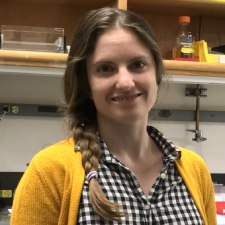
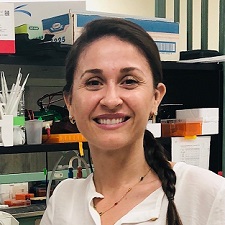
Current pancreatic cancer chemotherapies are not effective, and targeted therapies are only applicable in about 5% of cases. Furthermore, pancreatic cancers cause immune cell stress, limiting the success of immunotherapies in this disease. Using animal models and tumor samples from pancreatic cancer patients, Dr. Escobar-Hoyos [William Raveis Charitable Fund Innovator] has discovered that changes in RNA splicing, a process that controls protein diversity in cells, are crucial for pancreatic cancer development, therapy resistance, and disruption of anti-tumor immunity. She plans to dissect the molecular role of RNA splicing in pancreatic cancer, which likely drives the disease's lethality. She seeks to develop a novel anti-RNA splicing therapy with dual action-a targeted therapy against tumor cells coupled with an immunotherapy to restore immune cell anti-tumor activity-to more effectively treat pancreatic cancer patients.
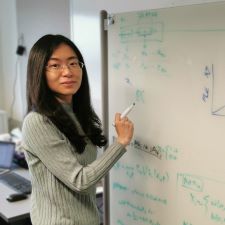
Patients with the same cancer diagnosis may experience very distinct disease progressions and treatment responses. These differences between patients have been associated with their degree of intra-tumor heterogeneity-the genetic, epigenetic, spatial, and environmental differences between the tumor cells. Characterizing the genetic and epigenetic states of different tumor cells is key to understanding how intra-tumor heterogeneity influences tumor progression, expansion, metastasis, and treatment response. Recent advances in single-cell RNA sequencing and spatial transcriptomics (which shows the spatial distribution of RNA molecules within a tissue sample) provide new opportunities to study intra-tumor heterogeneity in higher resolution. Dr. Ma's research aims to characterize intra-tumor heterogeneity in terms of specific genetic and epigenetic measures, and eventually develop 3D tumor models that capture this heterogeneity across multiple cancer types. Dr. Ma received her BS from Zhejiang University and her PhD in computational biology from Carnegie Mellon University.
The proposed computational methods will be based on previous methods developed in the group. Dr. Ma will develop a better method for identifying tumor clones for spatially resolved transcriptomics (SRT) data using both copy number and allele information using HMM and HMRF. She will adapt optimal transport frameworks and include biological networks as prior knowledge for integrating epigenetic data with SRT and between SRT slices to construct 3D spatial tumor multi-omics models.
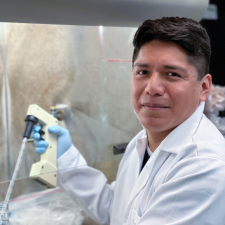
Human cells compact their vast genomes into the small confines of the nucleus by wrapping their DNA into a highly complex structure called chromatin. Packaging DNA into chromatin, however, affects all nucleic acid-transacting machines (e.g., transcription factors) that need to access the genomic information stored in the DNA. NuRD is a large multi-subunit protein complex that plays a major role in making chromatin either accessible or inaccessible. Dysregulation of NuRD and aberrant targeting of the complex can result in the emergence of several types of cancers, including breast, liver, lung, blood, and prostate cancers. Dr. Osorio Valeriano’s [Philip O'Bryan Montgomery, Jr., MD, Fellow] work will reveal mechanistic aspects of NuRD-mediated chromatin regulation and pave the way for the development of novel therapeutic approaches that target cancers more effectively. Dr. Osorio Valeriano received his PhD from Philipps University and his MSc and BSc from the National Autonomous University of Mexico.

Dr. Owens [Suzanne and Bob Wright Fellow] focuses on heat shock proteins (HSPs) and their “master regulator” called heat shock transcription factor 1 (HSF1). The transformation and growth of cancers causes a wide array of cellular stresses including metabolic changes, genomic instability, and protein misfolding that would halt the growth of a normal cell. Tumor cells, however, depend on cellular stress response machinery, like HSPs, for their survival. HSF1 is critical to tumor development and progression, and HSF1 activity is strongly correlated with poor prognosis in many common cancers. For decades, efforts to develop cancer therapies targeting HSPs have failed. Dr. Owens aims to understand how HSPs and HSF1 interact to regulate activity, and how this regulation is co-opted to promote tumor growth and progression.
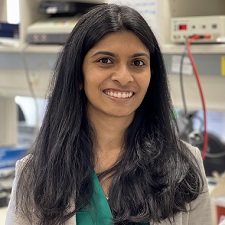
Despite the success of immunotherapies such as immune checkpoint blockade in other solid tumors, breast cancer patients have shown limited responses, especially in cases of metastatic disease. Antigen-presenting cells, critical to initiate anti-tumor immunity and for efficacy of immune checkpoint blockade, are known to be defective in breast cancers. Dr. Reddy's research focuses on restoring effective antigen presentation to enhance anti-tumor immunity in breast cancers. Based on data generated in her lab, she is leading a clinical trial to test the combination of chemotherapy with two therapeutic molecules that promote different aspects of antigen presentation. This trial will assess the safety, clinical efficacy, and pharmacodynamics associated with this triplet therapy. Through this work, she hopes to improve long-term survival of patients with triple negative breast cancer and lay the foundation for systemically targeting antigen presentation as a therapeutic strategy in solid tumors.
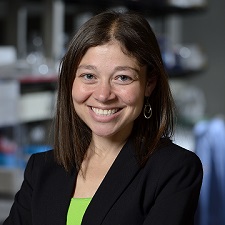
Groundbreaking advances in immunotherapy have revolutionized the treatment of cancer. In particular, new antibody drugs that block immunosuppressive pathways have achieved remarkable success in reawakening the immune system to clear tumor cells, leading to lasting cures in patients whose cancers do not respond to any other therapies. Unfortunately, the majority of patients (>70%) do not respond to immunotherapy treatment. It is difficult to predict which patients will benefit, creating an urgent demand for novel immunotherapy drugs that act through alternative mechanisms. Dr. Spangler is working to develop a class of antibody therapeutics that target cancer-promoting pathways in a different way than all current immunotherapies, with the goal of drastically expanding the percentage of cancer patients who benefit from them.
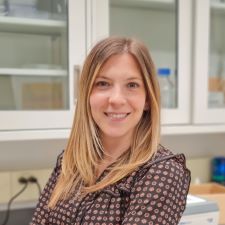
Breast cancer is the most frequent cancer in women and the second-leading cause of cancer deaths in women worldwide. Triple-negative breast cancer is among the most aggressive subtypes; its name refers to the fact that it lacks all three primary markers of breast cancer, making it particularly challenging to detect and treat. Although our ability to detect early-stage breast cancer has improved substantially over the past few decades, anticipating whether and how fast a tumor will progress to metastatic disease remains challenging. Dr. Trenado-Yuste aims to improve our ability to predict a tumor's disease course and response to therapy by creating a new framework of biomathematical models and experimentally engineered tumors, which may aid in prognostication and decrease cancer-related deaths.
Experimental research in cancer biology also drives a need for new computational models. This project focuses on mathematical modeling, with an emphasis on developing agent-based and pharmacokinetic models, to help clarify how tumor spheroids progress and respond to drug treatments. The importance and innovation of the proposed theoretical and computational methods lie in their potential to identify the optimal combinations of personalized treatment schedules for individual patients.
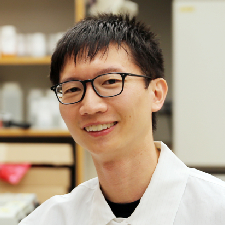
Many immunotherapy strategies require patient T cells to recognize specific cancer-associated antigens. However, it is unclear what these antigens are and how they contribute to tumor shrinkage during treatment. Dr. Zhu [HHMI Fellow] will use large-scale antigen screening methods to identify cancer-associated antigens recognized by T cells that are activated in breast cancer patients during immunotherapy treatment. Mapping the antigen landscape of breast cancer will identify targetable antigens and improve future immunotherapies. Dr. Zhu received his PhD from The Rockefeller University and his BSc from the National University of Singapore.







